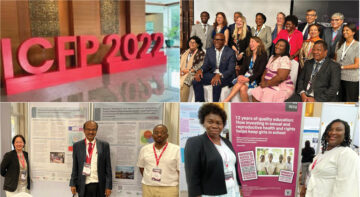Blogs

The Minister of Foreign Affairs, Honourable Nancy Tembo, M.P., said that African Institute for Development Policy (AFIDEP) ‘s support to the government will assist Malawi’s efforts in achieving the SDGs and Malawi’s Agenda 2063. The Minister said this while receiving letters of credence from Dr Eliya Msiyaphazi Zulu, AFIDEP’s Country Representative in Malawi, today. She noted that AFIDEP’s focus areas are essential for Malawi, especially highlighting the need to prioritise Education and Environmental issues.
The letters of credence submission follow the Government of Malawi’s conferring the diplomatic status on AFIDEP in 2021, a testament to the government’s resolve to attract more international organisations of AFIDEP’s calibre. The gesture further positions the country as a regional intellectual hub for developing evidence-informed public policies and programs to fast-track Africa’s sustainable development goals.
Dr Zulu applauded the Government of Malawi for granting AFIDEP diplomatic status, stating that the gesture demonstrates the government’s commitment to creating an enabling environment for the Institute’s work focused on putting evidence at the centre of development efforts in Malawi.
“The diplomatic status will undoubtedly strengthen AFIDEP’s financial and operational capacity to magnify the impact of our work in Malawi and across Africa. Specifically, it will enable AFIDEP to attract local and global development research and policy experts to support the Government of Malawi in enhancing the use of robust research evidence and data in public policy formulation and implementation,” he said.
“AFIDEP is committed to supporting the Government of Malawi in increasing access to and use of robust evidence and technical assistance to accelerate the achievement of the Malawi 2063 development aspirations”, Dr Zulu added.
AFIDEP is a pan-African research and policy institute established in 2010 to bridge the gaps between research, policy, and practice across Africa. Its vision is to see an Africa where evidence is used consistently to transform lives, with the mission to enable the use of evidence in the design and implementation of public policies and programmes. AFIDEP opened its offices in Malawi in 2013 and moved its headquarters from Nairobi to Lilongwe in 2022. The Institute’s work focuses on strengthening capacity for evidence use in the public sector and generating and translating evidence to inform policy formulation and program improvement on five thematic areas: 1) Population dynamics and the demographic dividend, 2) Health and wellbeing, 3) Transformative education and skills development, 4) Environment and climate change, and 5) Governance and Accountability. Gender equality is a cross-cutting thematic area.
AFIDEP’s work has helped strengthen individual and institutional capacity for evidence use and informed development policies and strategies in 26 African countries. In Malawi, AFIDEP works closely with ministries responsible for health; education; youth and sports; environment and climate change; and gender. The Institute also works with the Malawi Parliament and the National Planning Commission.
AFIDEP has a staff complement of over 70 employees from 10 countries, 16 with PhD, and 41 with Master’s degrees in various development fields.
About Dr Zulu: Dr Eliya Msiyaphazi Zulu is the founder and Executive Director of the African Institute for Development Policy (AFIDEP). Dr Zulu has had a distinguished career as a multi-disciplinary researcher and development practitioner with over 25 years of post-doctoral experience leading national and multi-country programmes in research, capacity building, and policy analysis. He has published over 70 peer-reviewed journal articles and research reports on various issues, including population change, education, reproductive health, HIV and AIDS, urban poverty, and migration.
Before founding AFIDEP, Zulu was the Deputy Director and Director of Research at the African Population and Health Research Centre (APHRC). He served as a Lecturer in Demography at the University of Malawi before then. He is the former President of the Union for African Population Studies, has served on many international development panels, and has given various high-level keynote addresses, including at the U.N. General Assembly.
Dr Zulu earned a Ph.D. and a master’s degree in Demography from the University of Pennsylvania, a master’s degree in Population and Development from the Australian National University, and a bachelor’s degree in Economics and Statistics from the University of Malawi.
Related Posts





